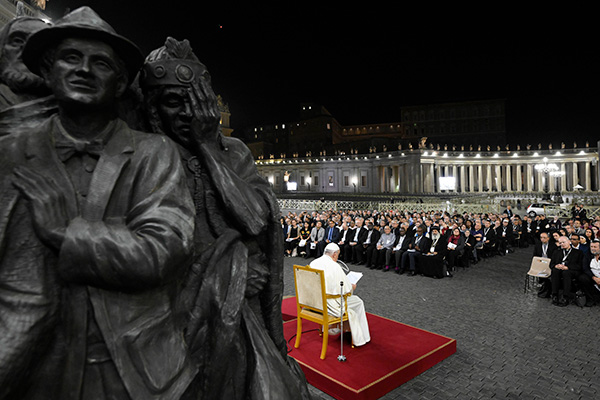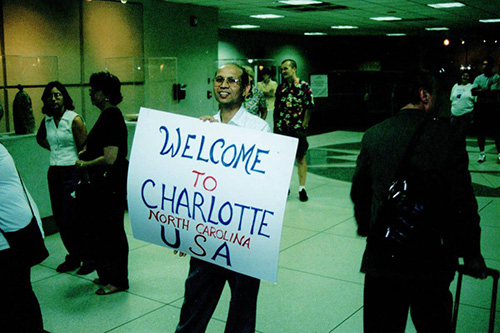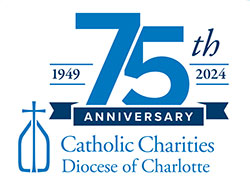 Pope Francis leads members of the assembly of the Synod of Bishops in praying for migrants and refugees in front of the statue, “Angels Unawares,” in St. Peter’s Square Oct. 19, 2023. The sculpture by Canadian Timothy Schmalz, depicts a boat with 140 figures of migrants from various historical periods and various nations. (CNS | Vatican Media)Editor's Note: Catholic Charities Diocese of Charlotte is highlighting the seven themes of Catholic Social Teaching in conjunction with its year-long 75th anniversary celebration. This second installment of the series focuses on “Welcoming the Stranger,” caring for all our sisters and brothers – especially refugees and migrants.
Pope Francis leads members of the assembly of the Synod of Bishops in praying for migrants and refugees in front of the statue, “Angels Unawares,” in St. Peter’s Square Oct. 19, 2023. The sculpture by Canadian Timothy Schmalz, depicts a boat with 140 figures of migrants from various historical periods and various nations. (CNS | Vatican Media)Editor's Note: Catholic Charities Diocese of Charlotte is highlighting the seven themes of Catholic Social Teaching in conjunction with its year-long 75th anniversary celebration. This second installment of the series focuses on “Welcoming the Stranger,” caring for all our sisters and brothers – especially refugees and migrants.
CHARLOTTE — A group of volunteers in Charlotte spends many hours each month preparing homes for people they don’t even know. Known as the Homemakers of Mercy, these dedicated men and women volunteer with Catholic Charities to furnish apartments and houses for refugee families the agency resettles into the Charlotte area.
This partnership is a vivid illustration of one of the seven principles of Catholic Social Teaching: welcoming the stranger.
Catholic Charities agencies around the country work in partnership with the U.S. Conference of Catholic Bishops, the U.S. State Department and state-run refugee offices to resettle refugees fleeing war, political upheaval, or religious, economic or ethnic persecution. In the diocese, the agency runs offices in Charlotte and Asheville, resettling roughly 300 refugees or more in a year.
After refugees go through a lengthy screening process in their home countries, Catholic Charities typically gets two weeks’ notice – and sometimes as little as 48 hours – to secure housing for incoming refugees. Once they arrive, the refugee services office then works to get adults employment and enroll children in school. The agency also offers youth programs such as summer camps, and helps refugees enroll in English classes and gain other skills they need to build new lives in North Carolina, says Laura Townsend Jones, refugee resettlement director for Catholic Charities.
“This is a legal pathway for these newcomers to get to the United States,” Jones said. “These individuals are fully vetted for health and security overseas before they come, and they have the support of our agency with a host of case management and employment services so they can reach self-sufficiency very quickly. We see them working and paying their bills on their own in a very, very short period of time.”
 For nearly 50 years, Catholic Charities has welcomed refugees from around the world to Charlotte, and more recently to Asheville, thanks to a partnership with the U.S. Conference of Catholic Bishops, the U.S. State Department, and the N.C. State Refugee Office. (Catholic Charities Archives)Catholic Charities has seen a sharp increase in the number of refugees coming to North Carolina in the past year. The agency expects to settle 420 people this fiscal year – surpassing its original target of 375 as well as last year’s total of 290 refugees.
For nearly 50 years, Catholic Charities has welcomed refugees from around the world to Charlotte, and more recently to Asheville, thanks to a partnership with the U.S. Conference of Catholic Bishops, the U.S. State Department, and the N.C. State Refugee Office. (Catholic Charities Archives)Catholic Charities has seen a sharp increase in the number of refugees coming to North Carolina in the past year. The agency expects to settle 420 people this fiscal year – surpassing its original target of 375 as well as last year’s total of 290 refugees.
Refugees come from countries around the world, with most recently moving to the Charlotte area from Syria, Myanmar, Afghanistan and Venezuela. Roughly 150 of the refugees, primarily from Ukraine, Venezuela and other Latin American countries, will go through the Asheville office.
The newcomers often leave their home countries with few possessions or sometimes nothing at all. Volunteers such as the Homemakers of Mercy must equip the apartments not only with furniture, but household goods such as basic kitchen utensils, bedding and shower mats and curtains. Catholic Charities helps the refugees learn how to navigate many facets of life in a new country, from speaking English and getting a bank account to using public transportation.
“After the initial help they receive when arriving here, we continue with robust support services including job training and financial literacy,” Jones said. “We also have a school impact program to support the students in achieving academic and social success.”
Welcoming those fleeing violence and persecution has roots in the Bible and Catholic teaching, said Joseph Purello, director of Catholic Charities’ Office of Social Concerns and Advocacy.
One scriptural reference that helps explain the Church’s teaching on welcoming the stranger, embodied in refugees and migrants, is the account in Matthew’s Gospel of the Holy Family fleeing into Egypt to escape the wrath of King Herod (Mt. 2:13-23), Purello said.
“The Catholic Church, inspired by the Holy Family’s flight to Egypt to escape Herod’s murderous wrath, deeply cares about refugees,” he said. “The combined efforts of parishes, Catholic Charities staff and volunteers and benefactors provide refugees with safety, dignity and hope. By helping those in need, we affirm our shared dignity as human beings made in the image and likeness of God.”
Another scriptural reference that addresses the topic is found in Hebrews 13:2: “Do not forget to show hospitality to strangers, for by so doing some people have shown hospitality to angels without knowing it.”
Purello said works of mercy like these are founded on the teachings of Jesus. “When we reach out in charity and compassion to refugees,” he said, “we are doing the corporal work of mercy of sheltering the homeless and the spiritual work of mercy of comforting the afflicted.”
He suggests the following “Share the Journey Prayer” as a way to further contemplate the idea of welcoming the stranger. It comes from the U.S. bishops’ conference, Catholic Relief Services  and Catholic Charities USA:
and Catholic Charities USA:
Almighty and ever-living God,
empower your one human family to join hands
on our journey of faith.
Send us your spirit of hope,
so that we may work
to alleviate human suffering
and foster charity and justice
in our world.
Amen.
— Christina Lee Knauss
More online
At www.ccdoc.org/refugee-resettlement: Explore resources and suggestions about how you can get involved in assisting refugee families. Questions on Catholic Charities Diocese of Charlotte’s social justice efforts? Contact Joe Purello at This email address is being protected from spambots. You need JavaScript enabled to view it. or 704-370-3225.


